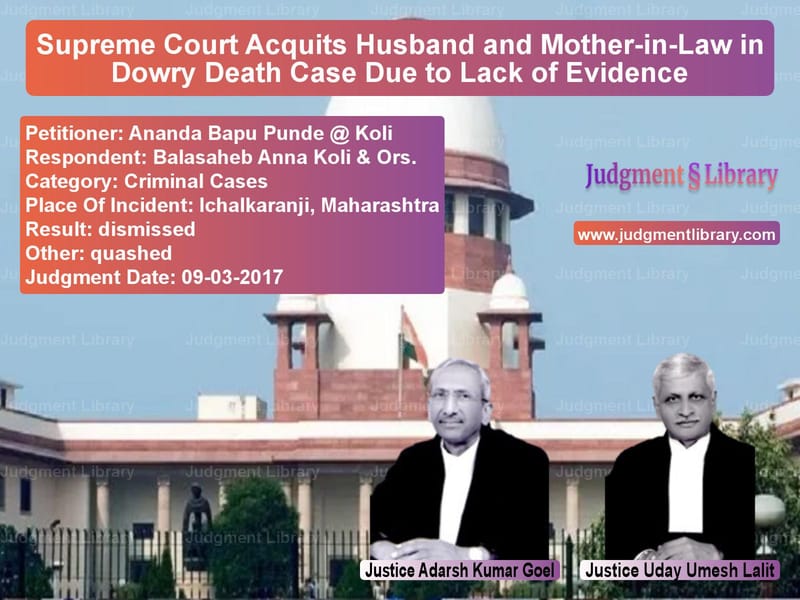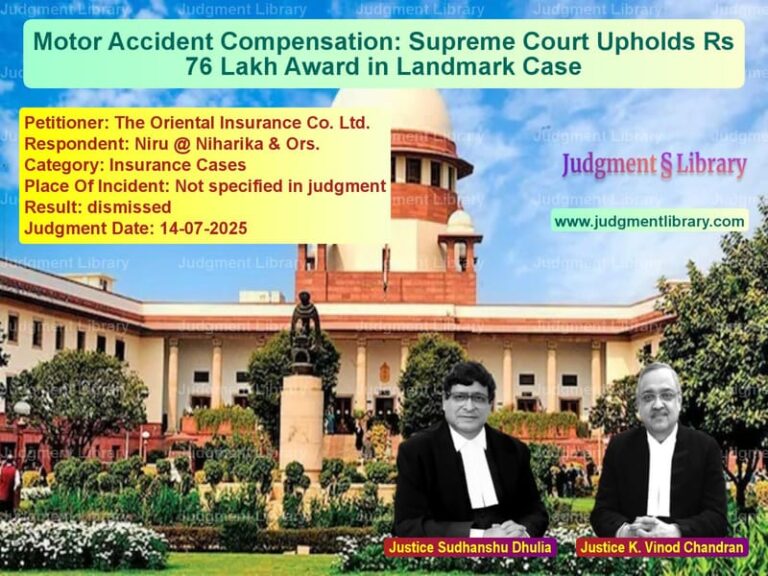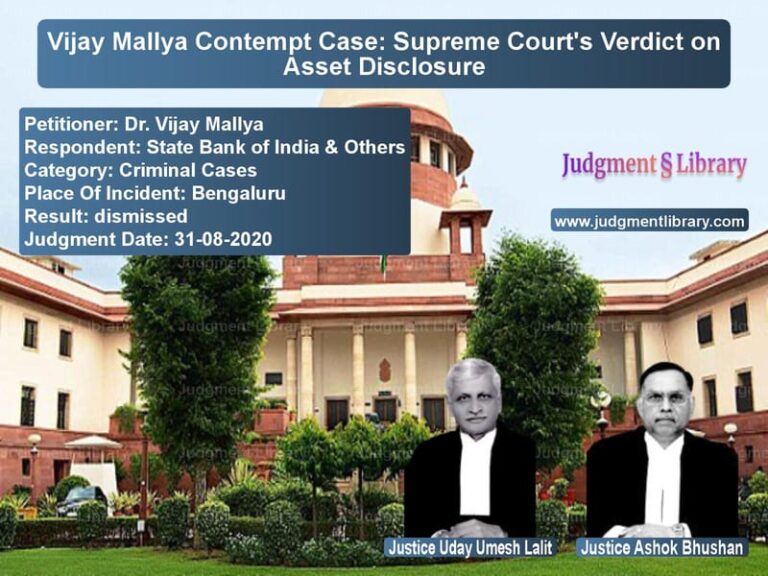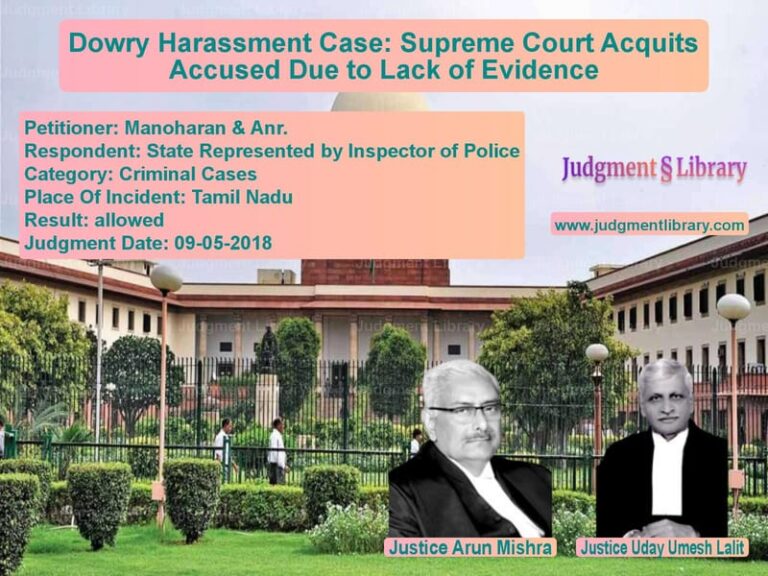Supreme Court Acquits Husband and Mother-in-Law in Dowry Death Case Due to Lack of Evidence
The case of Ananda Bapu Punde @ Koli vs. Balasaheb Anna Koli & Ors. is a significant judgment by the Supreme Court of India concerning a dowry death allegation. The case, which revolved around the suspicious death of Poonam within seven years of her marriage, highlights the importance of credible evidence and witness reliability in criminal cases related to dowry deaths and harassment under Sections 304B and 498A of the Indian Penal Code (IPC).
Background of the Case
The case involved the death of Poonam, the wife of respondent Balasaheb Anna Koli. Poonam was found dead in a well on June 12, 2002. The prosecution alleged that she had been harassed and killed by her husband and mother-in-law due to dowry demands. The prosecution also claimed that the husband had an extramarital affair, which contributed to Poonam’s harassment.
The key facts were as follows:
- The couple had been married since May 5, 1996 and had two children.
- The prosecution alleged that the respondents had demanded Rs. 50,000, a refrigerator, a sofa set, and gold as dowry and harassed Poonam when these demands were not met.
- The prosecution also claimed that Poonam had witnessed her husband in a compromising position with another woman two days before her death.
- The body of Poonam was found in a well, and a post-mortem report indicated that she had died due to asphyxia caused by drowning.
Trial Court’s Observations and Verdict
The case was initially heard by the Additional Sessions Judge, Ichalkaranji. The trial court acquitted the accused on June 28, 2012, based on the following observations:
- The post-mortem report did not show any signs of physical injury on Poonam’s body, ruling out the theory of murder followed by disposal of the body.
- The testimonies of Poonam’s parents and brother, who were key prosecution witnesses, were inconsistent and lacked credibility. They were declared hostile witnesses during the trial.
- The evidence did not conclusively establish that the accused had demanded dowry or subjected Poonam to cruelty as defined under Sections 498A and 304B of the IPC.
High Court’s Verdict
Aggrieved by the acquittal, Poonam’s father, Ananda Bapu Punde, filed a criminal appeal before the Bombay High Court. However, the High Court dismissed the appeal on September 13, 2013, agreeing with the trial court’s findings and concluding that there was insufficient evidence to convict the accused.
Supreme Court’s Analysis and Final Judgment
Poonam’s father then appealed to the Supreme Court, challenging the judgments of the trial court and the High Court. The Supreme Court, comprising Justice Adarsh Kumar Goel and Justice Uday Umesh Lalit, analyzed the evidence and observed:
“Inquest panchanama and post-mortem report show that there were no marks of injury on the body and that the deceased had died as a result of drowning. Thus, the theory that Poonam was done to death earlier and thereafter her body was thrown into the well, was rightly not accepted by the Courts below.”
The Court further noted that the allegations of dowry harassment were not substantiated by credible evidence:
“The evidence unfolded through the family members of the deceased namely PWs 3, 4, and 5 is completely sketchy and does not establish the case at all. All these three witnesses were declared hostile.”
Regarding the allegation of an extramarital affair, the Court observed:
“PW 3 Ananda went on to state that two days prior to the incident Poonam had seen Respondent No.1 in a compromising position with another lady. This part was rightly not accepted by the Courts below as amounting to cruelty or harassment enough to bring the case under Section 306 of IPC.”
Based on these findings, the Supreme Court concluded that the lower courts were justified in acquitting the accused and dismissed the appeal.
Legal Implications of the Judgment
This judgment reinforces several key principles in criminal law:
- Presumption of Innocence: The accused are presumed innocent until proven guilty beyond a reasonable doubt.
- Burden of Proof: The prosecution must present credible and consistent evidence to establish guilt.
- Reliability of Witnesses: The credibility of prosecution witnesses is crucial in dowry death cases.
- Admissibility of Evidence: Mere allegations, without corroborating evidence, are insufficient to secure a conviction.
Impact on Future Dowry Death Cases
This ruling sets an important precedent for future cases involving allegations of dowry death and harassment:
- Courts must scrutinize the evidence carefully, particularly when it comes to allegations of dowry demands and harassment.
- Witnesses who turn hostile can weaken the prosecution’s case, emphasizing the need for robust and consistent testimonies.
- The prosecution must establish a clear causal link between the alleged harassment and the death to secure a conviction under Sections 304B and 498A of the IPC.
Conclusion
The Supreme Court’s decision in Ananda Bapu Punde @ Koli vs. Balasaheb Anna Koli & Ors. underscores the importance of credible evidence in criminal cases. By upholding the acquittal, the judgment emphasizes that allegations alone are not sufficient to secure a conviction and that the prosecution must prove its case beyond a reasonable doubt.
Don’t miss out on the full details! Download the complete judgment in PDF format below and gain valuable insights instantly!
Download Judgment: Ananda Bapu Punde @ vs Balasaheb Anna Koli Supreme Court of India Judgment Dated 09-03-2017.pdf
Direct Downlaod Judgment: Direct downlaod this Judgment
See all petitions in Dowry Cases
See all petitions in Murder Cases
See all petitions in SC/ST Act Case
See all petitions in Judgment by Adarsh Kumar Goel
See all petitions in Judgment by Uday Umesh Lalit
See all petitions in dismissed
See all petitions in Quashed
See all petitions in supreme court of India judgments March 2017
See all petitions in 2017 judgments
See all posts in Criminal Cases Category
See all allowed petitions in Criminal Cases Category
See all Dismissed petitions in Criminal Cases Category
See all partially allowed petitions in Criminal Cases Category







